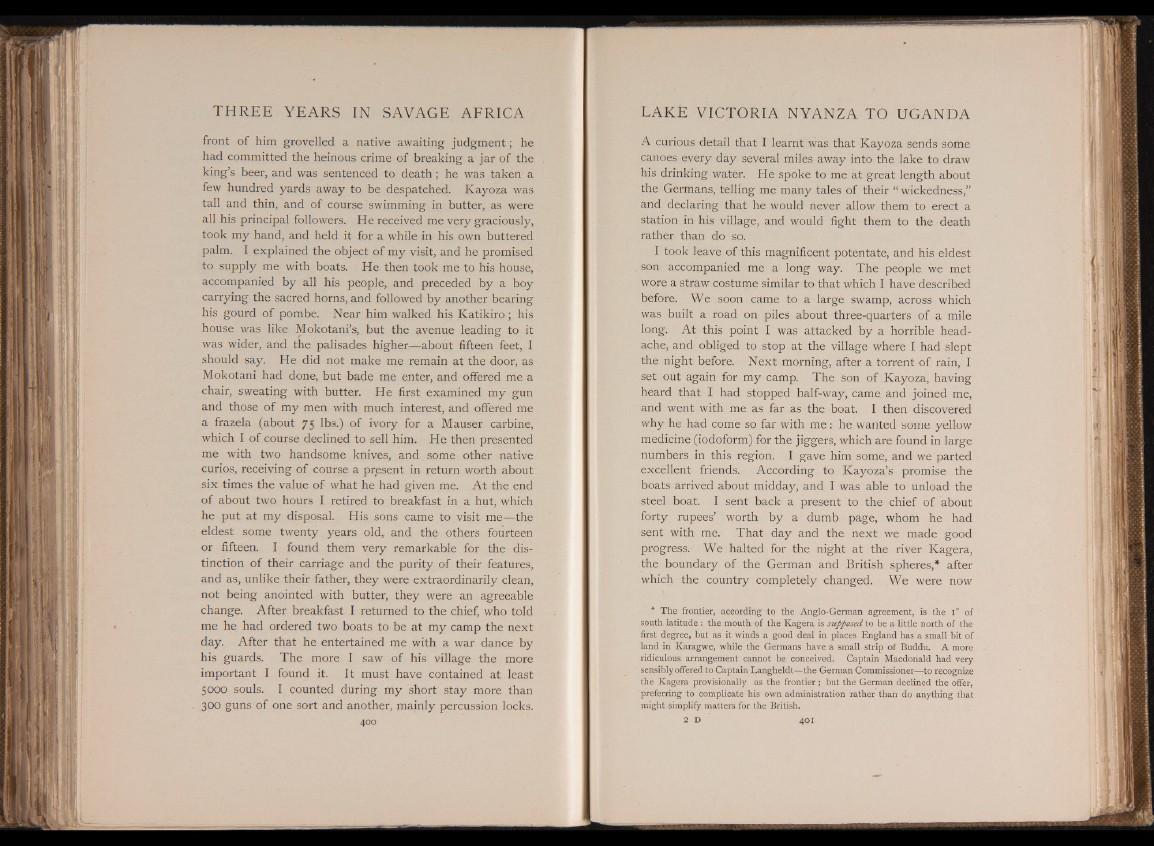
front of him grovelled a native awaiting judgment ; he
had committed the heinous crime of breaking a jar of the
king’s beer, and was sentenced to death; he was taken a
few hundred yards away to be despatched. Kayoza was
tall and thin, and of course swimming in butter, as were
all his principal followers. He received me very graciously,
took my hand, and held it for a while in his own buttered
palm. I explained the object of my visit, and he promised
to supply me with boats. He then took me to his house,
accompanied by all his people, and preceded by a boy
carrying the sacred horns, and followed by another bearing
his gourd of pombe. Near him walked his Katikiro; his
house was like Mokotani’s, but the avenue leading to it
was wider, and the palisades higher—about fifteen feet, I
should say. He did not make me remain at the door, as
Mokotani had done, but bade me enter, and offered me a
chair, sweating with butter. He first examined my gun
and those of my men with much interest, and offered me
a frazela (about 75 lbs.) of ivory for a Mauser carbine,
which I of course declined to sell him. He then presented
me with two handsome knives, and some other native
curios, receiving of course a present in return worth about
six times the value of what he had given me. At the end
of about two hours I retired to breakfast in a hut, which
he put at my disposal. His sons came to visit me—the
eldest some twenty years old, and the others fourteen
or fifteen. I found them very remarkable for the distinction
of their carriage and the purity of their features,
and as, unlike their father, they were extraordinarily clean,
not being anointed with butter, they were an agreeable
change. After breakfast I returned to the chief, who told
me he had ordered two boats to be at my camp the next
day. After that he entertained me with a war dance by
his guards. The more I saw of his village the more
important I found it. It must have contained at least
5000 souls. I counted during my short stay more than
300 guns of one sort and another, mainly percussion locks.
400
A curious detail that I learnt was that Kayoza sends some
canoes every day several miles away into the lake to draw
his drinking water. He spoke to me at great length about
the Germans, telling me many tales of their “ wickedness,”
and declaring that he would never allow them to erect a
station in his village, and would fight them to the death
rather than do so.
I took leave of this magnificent potentate, and his eldest
son accompanied me a long way. The people we met
wore a straw costume similar to that which I have described
before. We soon came to a large swamp, across which
was built a road on piles about three-quarters of a mile
long. At this point I was attacked by a horrible headache,
and obliged to stop at the village where I had slept
the night before. Next morning, after a torrent of rain, I
set out again for my camp. The son of Kayoza, having
heard that I had stopped half-way, came and joined me,
and went with me as far as the boat. I then discovered
why he had come so far with me: he wanted some yellow
medicine (iodoform) for the jiggers, which are found in large
numbers in this region. I gave him some, and we parted
excellent friends. According. to Kayoza’s promise the
boats arrived about midday, and I was able to unload the
steel boat. I sent back a present to the chief of about
forty rupees’ worth by a dumb page, whom he had
sent with me. That day and the next we made good
progress. We halted for the night at the river Kagera,
the boundary of the German and British spheres,* after
which the country completely changed. We were now
* The frontier, according to the Anglo-German agreement, is the 1° of
south latitude : the mouth of the Kagera is supposed to be a little north of the
first degree, but as it winds a good deal in places England has a small bit of
land in Karagwe, while the Germans have a small-strip of Buddu. A more
ridiculous arrangement cannot be conceived. Captain Macdonald had very
sensibly offered to Captain Langheldt—the German Commissioner—to recognize
the Kagera provisionally as the frontier; but the German declined the offer,
preferring to complicate his own administration rather than do anything that
might simplify matters for the British.